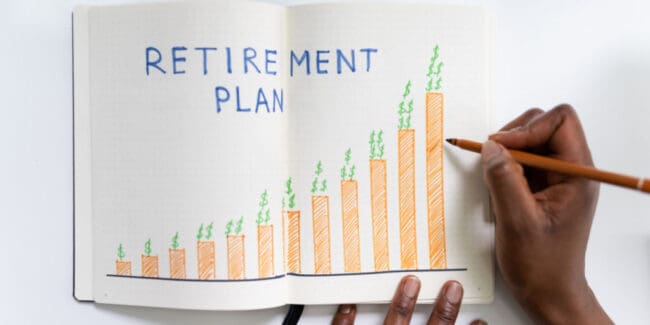Protect Your Retirement Savings from Inflation
(This page may contain affiliate links and we may earn fees from qualifying purchases at no additional cost to you. See our Disclosure for more info.)
After a record-high stock market, low-interest rates from the Federal Reserve, and pandemic woes, inflation arrived.
Inflation, a general increase in prices for goods and services, which reduces the purchasing power of money, may sound scary.
Yet inflation, at least in moderation, is part and parcel of a healthy economy.
When consumers think prices will continue increasing over time, they’re more likely to buy products now, rather than waiting until later, when products might be more expensive.
This leads to an increase in production, which means more jobs in our economy.
However, when you’re making plans for retirement, higher-than-average inflation rates can eat away at the purchasing power of your nest egg. So, it’s essential to consider accounting for inflation in retirement planning.

What Causes inflation?
Inflation happens when the amount of money entering the economy is more significant than its economic growth.
If the government prints more money to cover debts but people slow down their purchase of goods and services, that flood of extra dollars into the economy will cause prices to rise.
Typically, if prices of goods rise, employers will have to raise their wages accordingly to continue attracting employees willing to work for them. This is especially true if the unemployment rate is low and fewer people are looking for jobs.
If for some reason, wages do not continue to rise in tandem with the prices of goods and services, then the standard of living for employees decreases, and they’re not able to buy as much or enjoy as high a quality of life.
Inflation for General Population
People in different parts of the country don’t necessarily feel the effects of inflation in the same ways. Economists measure inflation by looking at several different figures.
In the US, they use the Consumer Price Index. This is an index of prices that consumers pay for thousands of products and services in urban areas (since 80% of consumers in the US live in urban areas)
While one consumer in Chicago may pay $3.89 for a gallon of milk, another may only have to pay $2.49 in the Southeast.
Economists also factor housing costs into the total inflation rate. But housing expenses are another cost that can vary a lot depending on what part of the country you live in.
Inflation for Retirees
What does the possibility of inflation mean if you’re a retiree or plan to retire in the next few years?
If the costs of goods and services rise over time, then the power of your retirement savings decreases. That is, your retirement dollars will buy less for you during retirement than the year before.
And while you may not notice price increases in the short term, the compounding effect of an inflation increase can erode your purchasing power in the long term.
Most retirement plans factor in a moderate rate of inflation, usually 3%. Still, if inflation rises to 1970s-era levels, that could throw off the amount of purchasing power you’ll have in retirement, especially the longer you’re retired.
So how can you properly prepare for the effects of inflation during your retirement years?
Prepare for Inflation in Retirement
To help your finances withstand inflationary periods once you retire, practice the following:
1. Consider Inflation in Your Retirement Planning
Most retirement simulators factor a moderate inflation rate into the amount of money you’ll need when you retire.
Yet, you may want to calculate how much you'd need if the economy experiences higher-than-normal inflation levels during your retirement years.
Instead of assuming a 3% inflation rate, calculate how much you would need to keep pace with inflation if it were higher.
Start with 4% (this is probably realistic given that the average inflation in the 70s, one of the highest inflation rates in modern history, was only 6.8%).
How much will this change:
- The amount you need to save for retirement?
- Your investment strategies – now and in retirement?
- Your spending ability in retirement?
Accounting for inflation in retirement planning may mean putting off retirement, saving a bit more, or investing in different asset classes to account for potentially higher inflation rates.
Read also: Healthcare Costs in Retirement – Avoid These Big Mistakes
2. Choose Investments that Rise with Inflation
It’s also essential to make sure your retirement assets are invested in ways that provide some inflation protection.
If you're invested heavily in a nice mix of stocks, there’s a good chance that the stock market will rise in tandem with inflation.
This is especially true if you invest in index funds or exchange-traded funds (ETFs) that mirror the market, such as the S&P 500, for example.
Another investment that's a hedge against inflation is TIPS or Treasury inflation-protected securities. TIPS are US-issued bonds indexed to inflation, so if the inflation rate goes up, so will your bond rate.
Some people are comfortable investing in other alternative investments, such as gold and other precious metals or real estate, whether real property, a real estate investment trust (REITs), or crowdfunded properties, to hedge against inflation.
While some risk is essential, others may consider these investments a bit too risky during their golden years. Be sure you do your research before adding alternative assets to your investment portfolio.
If you have an inflation-adjusted pension, you have a considerable safeguard against inflation. Social Security payments are also adjusted annually to account for inflation.
Having a well-diversified retirement portfolio means the chances are good you’ll be better-protected to withstand a few higher-than-average inflation years during your retirement.
Read: Worthy Bonds Review: Earn 5% Fixed Interest from Day 1
3. Delay Social Security
If you have a long life expectancy and adequate retirement savings, delaying Social Security benefits can give you another tool to guard against future inflation.
Each year you delay starting Social Security payments from 62 – 70 will provide increased benefits when you do draw.
Plus your SS payments are inflation-protected with an annual increase in benefits. You can find an estimate of your future benefits by visiting SSA.gov and creating an account.
Some financial advice you might read suggests building a retirement plan that includes reduced SS payments, while others advise not planning for it at all. While the future of Social Security is still uncertain, it's not likely to disappear.
4. Add Sources of Income
Side-gigs aren’t just for the youngins. Plenty of retirees do some type of work for a stream of income once they leave full-time employment.
Perhaps you can:
- Provide consulting services for your previous employer or industry
- Turn a hobby into an income source
- Tutor high school students or teach ESL (English as a Second Language)
- Obtain a part-time or seasonal position
- Sell a service online or within your local community (personal assistant or virtual assistance, bookkeeping, writing, editing, etc.)
- Perform house or pet-sitting services
In addition to a wide variety of work you could take on, also consider renting out space in your home or vacation property you own.
For those who would like a “guaranteed” paycheck in retirement, you might consider an annuity product for a source of lifetime income.
While annuities aren’t for everyone, if you worry about running out of money if you live past 90, consider a deferred annuity.
It can be a good option to add to your retirement plan when you're looking for an additional income stream for life without an expiration date.
5. Keep an Eye on Spending in Retirement
One of your best bets against inflation expectations in retirement is your spend rate.
You may think your spending will remain relatively static in retirement. The reality is, the expenditure of money over time tends to fluctuate quite a bit. Your most significant spending typically occurs at the beginning of retirement.
The US Bureau of Labor Statistics provides data on spending for older Americans.
In 2019, its Consumer Expenditure Survey showed average annual expenditures of $68,214 for individuals aged 55-64 and $55,822 for those 65-74. For those over age 75, the average was just $43,446.
Michael K. Stein, a certified financial planner, coined the phrases “Go-Go Years,” “Slow Go Years,” and “No-Go Years” to describe the way older Americans’ spending patterns change with time.
Spending is higher for people in their 50s as they support children in college, pay off mortgages, and travel.
In their 60s, people have generally slowed down, paid off mortgages, and need to help adult children less.
Finally, in their 70s and beyond, spending drops dramatically in all categories except healthcare and housing.
In the same New York Times article, Katherine Roy, a chief retirement strategist at JP Morgan Asset Management, predicts that because of these spending trends, traditional retirement planning tools “could overstate spending in late retirement by 30% or more.”
Adjusting your spending
If you’re willing to adjust your spending rate, especially in hyperinflation years, you can reduce the amount of money you’ll need in retirement.
The 4% rule allows you to take out 4% of your retirement portfolio per year, adjusted for inflation.
So, if the stock market increases by 7% in year 2, then you’d be able to take out 4% of your portfolio and be able to sustain a 3% annual inflation rate.
And, if you’re able to decrease your spending, especially over time, then chances are very good that your portfolio will be able to withstand inflation over time.
Accountin for Inflation in Retirement Planning
It’s impossible to know how much or not inflation rates will rise in the future. Yet, you can plan for it.
One way is by assuming a higher-than-normal inflation rate when you estimate how much you’ll need for retirement.
Another inflation hedge is to ensure your retirement assets are in a diversified portfolio, with at least some of your holdings in inflation-protected investments.
Additionally, you can prepare to lower your spending or add to your income during times of inflation in retirement. This will be especially beneficial during periods of hyperinflation.
The future is a question mark. Still, careful planning and flexibility can help you withstand challenges like higher-than-normal inflation, even in retirement.
Next:
- Saving for Retirement While Helping Kids & Parents
- What To Do If Retirement Savings Is Not Yet Enough
- How to Avoid Mistakes in Retirement Planning

Article written by Laurie
Laurie is a team member of Women Who Money and the founder of The Three Year Experiment, a blog about building wealth in order to become location independent.
